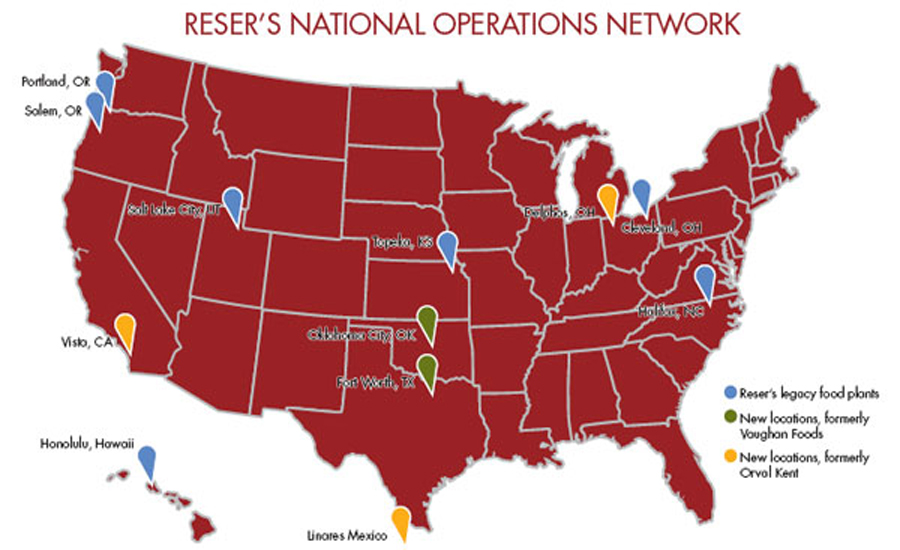Reser’s adds seven plants in just five months – and keeps the focus on quality, food safety and customer service.
Think your holidays were traumatic? Tony Kunis added nearly 1,200 new members to his family – right before the end of last year.
In just a three-month span last fall, Reser’s Fine Foods purchased both Vaughan Foods Inc., Moore, Okla.; and Orval Kent Food Company, based in Wheeling, Ill. Reser’s went into last summer with 2,500 employees at 13 facilities nationwide. It would end the year with 3,700 employees at nearly 20 plants, including a former Orval Kent operation in Linares, Mexico.
Reser’s also added two more facilities to its own network last year. It built an 85,000-square foot tortilla plant in Halifax, N.C., and has just completed a 160,000-square-foot multi-temp distribution center in Topeka, Kan.
Tony Kunis is Reser’s vice president of operations. And no . . . you wouldn’t have found him singing “Auld Lang Syne” on New Year’s. On the contrary, Kunis knows that Reser’s operations team has no time to dwell on the past. Rather, this 31-year company operations veteran knows the key to success is to look ahead and keep things simple, focused.
“Although there may be opportunities to be distracted by our recent M&A activity, we are committed to excellent customer service for our larger organization,” he says. “We have new programs to exceed customer expectations – particularly for new customers that may come along with these new companies, as well as our most loyal, long-term customers.
“This is going to be a busy year of integrating businesses and bringing our own new plants online,” he continues. “Yet, we have to remain focused, produce a consistent product day-in, day-out and improve processes that better serve our customers.”
Observers could say Reser’s operations strategy involves programs, people and process technologies. Here’s a look at each area.
Programs: Kunis says Reser’s is committed to global Safe Quality Foods (SQF) certification, which requires a comprehensive implementation of food safety and quality management systems. All Reser’s plants have earned SQF Level 2 status and two sites already have achieved higher Level 3 certifications, says Kunis. The goal is for every plant to achieve a Level 3 rating.
“SQF is a campaign that has to engage all employees to be successful,” Kunis says. “That is our strategy. Moreover, it’s recognized by the food industry and can help improve our processes. Our general managers’ preventive maintenance and quality control teams are fully engaged with SQF and went through extensive training to become SQF certified.”
People. Employees are a source of strength for Reser’s, particularly at its legacy operations where many associates have 20, 30 and even 40 years of service.
“People who stay with us say they like our family-friendly environment, the opportunities to learn and advance, and our extraordinary health care programs,” says Kunis. “We want to better promote Reser’s as a great place to work. We strive to be the ‘employer of choice’ in all the communities where we have operations.”
Process technologies. Reser’s has continued investing throughout its operations network – in addition to money spent against acquisitions and new construction. Kunis mentions a $2 million remodel / renovation project at the one company’s Topeka locations.
“We are putting more automation in the plants every year so we can more precisely tune the hundreds of recipes and products we make every day,” says Kunis. “We’re striving for a salad plant capable of running more than 100 different salads, sauces and or deserts in a single day. Our automation is set up to produce a variety of packaging sizes, from 3-ounce cups to 30-pound containers and all points in between.”
Kunis notes that customer shelf life guarantees drive Reser’s business.
“Most of our products are produced on one day and delivered during the next three days. We have to be very flexible in our manufacturing processes to be sure we can quickly and efficiently deliver consistent products daily. Each recipe – of the hundreds we produce – might be run as often as three times a week and could end up in 15 to 20 different sizes of packaging.”
Looking ahead, Kunis admits that he still has quite a bit to do. For starters, Reser’s will need to study, synchronize and otherwise consolidate (or integrate) its acquired companies’ operating software platforms, product recipes, packaging, labeling and vendors.
And whereas most of the former Orval Kent plants and product lines (aside from fresh-cut fruit) are similar to Reser’s, Vaughan’s fresh-cut produce plant in Moore, Okla., presents an entirely different scenario.
“Fresh-cut produce requires different lead times and delivery times,” says Kunis. “We literally take orders in the afternoon and then produce the products all night for departure in a 500-mile radius the next day.
“So we have to work with a one-day shipping deadline from the time we take the order to the time the product ships,” he says. “We’re very excited to learn about this and expand the fresh-cut choices for all of our customers”
Carbon footprint: What's our shoe size?
Many foodservice and private label food suppliers aren’t in the sustainability spotlight like their public CPG counterparts. Even so, a big company such as Reser’s knows it has a big responsibility for protecting the environment.
That’s why one of Reser’s largest 2011 projects did not grab headlines – although it did drive internal company discussions.
“We are publishing our first report on sustainability and efforts to measure our own carbon footprint,” says Dave Lakey, vice president of marketing. “We supply some of the nation’s largest foodservice operators and retailers and we want to be more proactive in sharing our reduction goals with them.”
Here are a few of Reser’s sustainability activities involving …
… packaging and material reductions
-
Recover organic waste materials (such as potato peels) and sell them as animal feed to local operators;
-
Select plastic packaging with polymers that are primary to curbside consumer waste recycling programs
-
Shift to more thin-walled containers that minimize total packaging mass
-
Specify energy-reducing packaging production processes wherever possible
-
Install energy-efficient plant lighting including T50 light bulbs
-
Increase use of post-consumer PET plastic; target is above 20 percent
-
Consider paperboard suppliers to comply with Sustainable Forestry Initiative guidelines
-
Recycle paper and containers in all plants, administrative offices
… energy, water and air management
-
Reser’s invested more than $1 million to build new water pretreatment facilities in Topeka, Kan. This operation serves a four-plant campus.
-
Reser’s built a similar system in Halifax, N.C. (its largest single operation). Related technologies there let Reser’s divert oil and grease for possible biofuel use.
-
Reser’s installed energy efficient refrigeration piping in Topeka.
… fleet and supply chain operations
-
Reser’s fleet of more than 200 tractor-trailers joined EPA’s federal SmartWay Transport Partnership. SmartWay Partners agree to assess freight operations, calculate fuel consumption and carbon footprint and track annual fuel efficiency and emission reductions.
Say "Olé"
Did you know that Reser’s is a leading national Mexican foods supplier? It has four plants nationwide producing hundreds of shelf-stable, refrigerated and frozen Mexican items for retail, c-store and foodservice customers.
Here are a few more facts and figures.
-
Responding to retail customers’ interest in a national tortilla supplier, Reser’s built a $15 million tortilla plant in Halifax, N.C., adjacent to its deli salad operation there. The new 85,000-square-foot facility can produce dozens of tortillas and wraps varieties each day. The company sells flour, corn and specialty tortillas primarily under the Don Pancho brand.
“We are supporting a national brand strategy for tortillas from an operations perspective,” notes Tony Kunis. “Since our acquisition of Don Pancho in the West, our larger customers wanted coast-to-coast availability and quick turnaround. After rebuilding the Oregon plant a few years ago, we knew how to make a competitive tortilla baking facility [in the East].”-
-
As measured by Nielsen, Reser’s national brand tortilla retail availability grew 50 percent in the last year-
-
Reser’s says it is a preferred national supplier of frozen burritos for some of the nation’s largest c-store chains and has made steady progress in K-12 school programs.-
-
Reser’s processes and distributes Baja Café refrigerated salsa nationwide.
Doorway to innovation
New multi-million Customer R&D Center equipped to please foodservice operators, retailers.
Need a new sizzling side dish or salad? How about an appetizing entrée? When it came time to step up its research and development capabilities, Reser’s knew it had to put its money where its mouth is … so to speak.
That’s why the company spent millions in 2009 to renovate a 10,000-square-foot portion of its Beaverton, Ore., headquarters. The result? The company’s new Customer R&D Center features a development lab that mimics major restaurant chains, customer presentation rooms, bench-top product development tools and common appliances found in most consumers’ homes.
“This is where ideas become a reality,” says Barbara Jordan, director of R&D and quality assurance. “Many retailers are looking for ways to offer a restaurant-like experience in their in-store delis. And many foodservice operators want to entice budget-conscious consumers back into restaurants with unique menu items and greater value. In our R&D Center, we have the tools, culinary expertise, market leadership and passion to help customers achieve these, and other, business goals,”
As an SQF-certified company, Reser’s says it also provides a deep bench of regulatory, safety and scientific technical resources.






